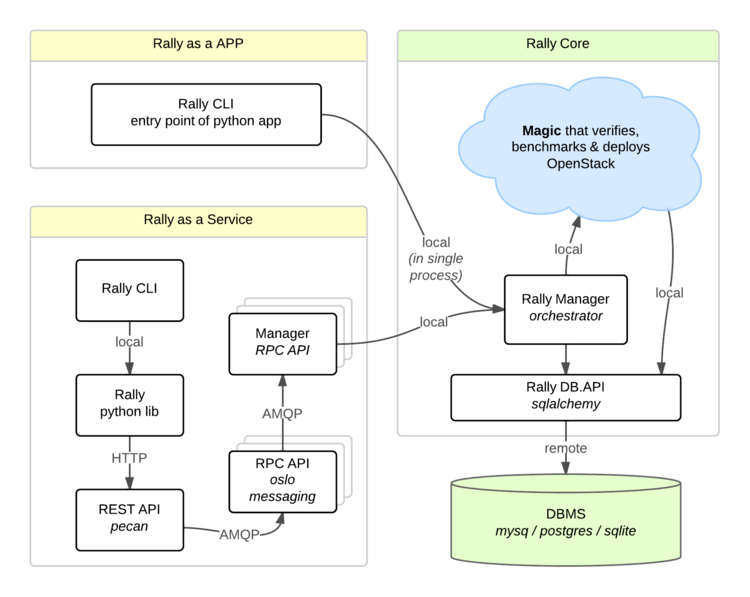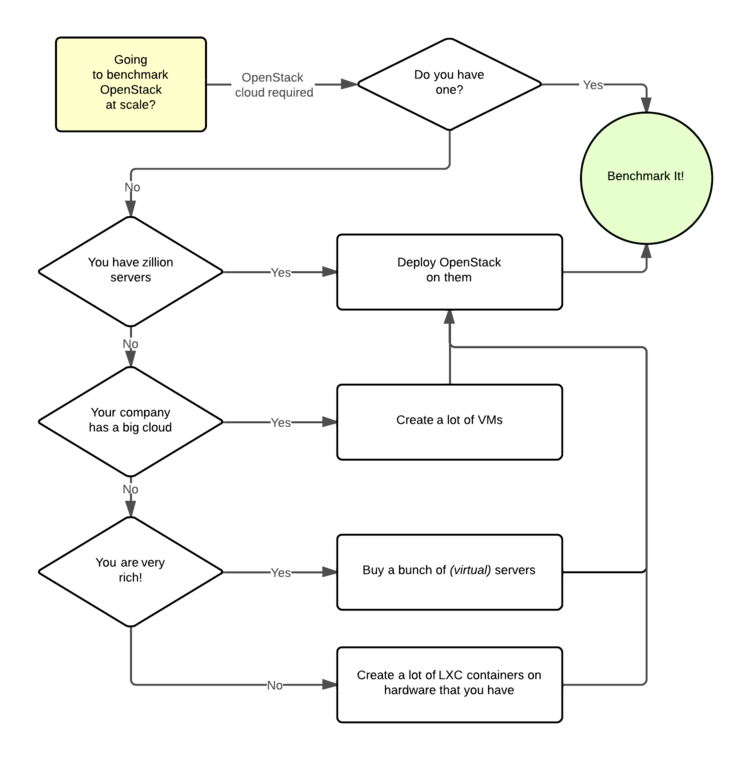Difference between revisions of "Rally"
m |
m |
||
| Line 3: | Line 3: | ||
== What is Rally? == | == What is Rally? == | ||
| − | If you are here, you are probably familiar with OpenStack and you also know that it's a really huge ecosystem of cooperative services. When something fails, performs slowly or doesn't scale, it's really hard to answer different questions on | + | If you are here, you are probably familiar with OpenStack and you also know that it's a really huge ecosystem of cooperative services. When something fails, performs slowly or doesn't scale, it's really hard to answer different questions on ''"what"'', ''"why"'' and ''"where"'' has happened. Another reason why you could be here is that you would like to build an OpenStack CI/CD system that will allow you to improve SLA, performance and stability of OpenStack continuously. |
The OpenStack QA team mostly works on CI/CD that ensures that new patches don't break some specific single node installation of OpenStack. On the other hand it's clear that such CI/CD is only an indication and does not cover all cases (e.g. if a cloud works well on a single node installation it doesn't mean that it will continue to do so on a 1k servers installation under high load as well). Rally aims to fix this and help us to answer the question "How does OpenStack work at scale?". To make it possible, we are going to automate and unify all steps that are required for benchmarking OpenStack at scale: multi-node OS deployment, verification, benchmarking & profiling. | The OpenStack QA team mostly works on CI/CD that ensures that new patches don't break some specific single node installation of OpenStack. On the other hand it's clear that such CI/CD is only an indication and does not cover all cases (e.g. if a cloud works well on a single node installation it doesn't mean that it will continue to do so on a 1k servers installation under high load as well). Rally aims to fix this and help us to answer the question "How does OpenStack work at scale?". To make it possible, we are going to automate and unify all steps that are required for benchmarking OpenStack at scale: multi-node OS deployment, verification, benchmarking & profiling. | ||
Revision as of 13:11, 24 February 2014
Contents
What is Rally?
If you are here, you are probably familiar with OpenStack and you also know that it's a really huge ecosystem of cooperative services. When something fails, performs slowly or doesn't scale, it's really hard to answer different questions on "what", "why" and "where" has happened. Another reason why you could be here is that you would like to build an OpenStack CI/CD system that will allow you to improve SLA, performance and stability of OpenStack continuously.
The OpenStack QA team mostly works on CI/CD that ensures that new patches don't break some specific single node installation of OpenStack. On the other hand it's clear that such CI/CD is only an indication and does not cover all cases (e.g. if a cloud works well on a single node installation it doesn't mean that it will continue to do so on a 1k servers installation under high load as well). Rally aims to fix this and help us to answer the question "How does OpenStack work at scale?". To make it possible, we are going to automate and unify all steps that are required for benchmarking OpenStack at scale: multi-node OS deployment, verification, benchmarking & profiling.
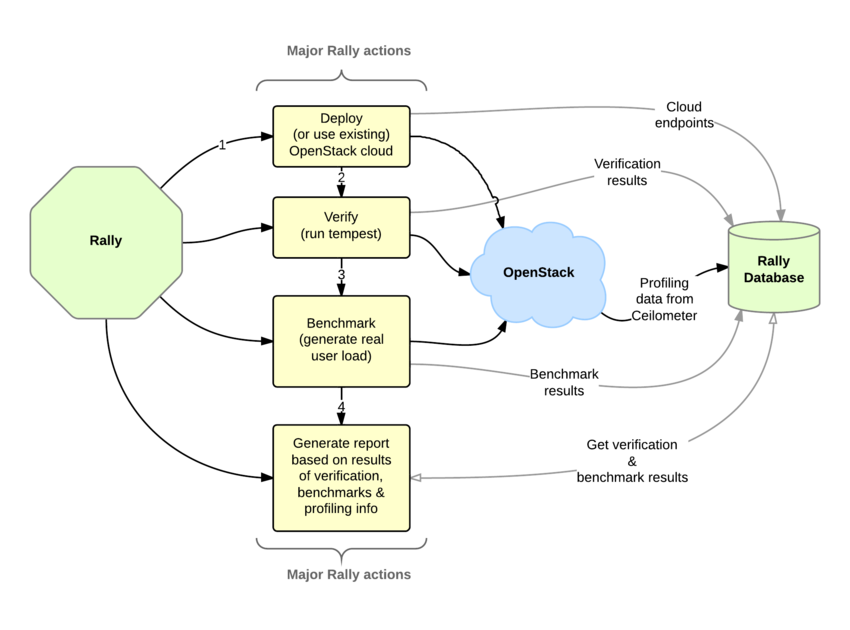
- Deploy engine is not yet another deployer of OpenStack, but just a pluggable mechanism that allows to unify & simplify work with different deployers like: DevStack, Fuel, Anvil on hardware/VMs that you have.
- Verification - (work in progress) uses tempest to verify the functionality of a deployed OpenStack cloud. In future Rally will support other OS verifiers.
- Benchmark engine - allows to create parameterized load on the cloud based on a big repository of benchmarks.
For more information about how it works take a look at Rally Architecture
Use Cases
Before diving deep in Rally architecture let's take a look at 3 major high level Rally Use Cases:
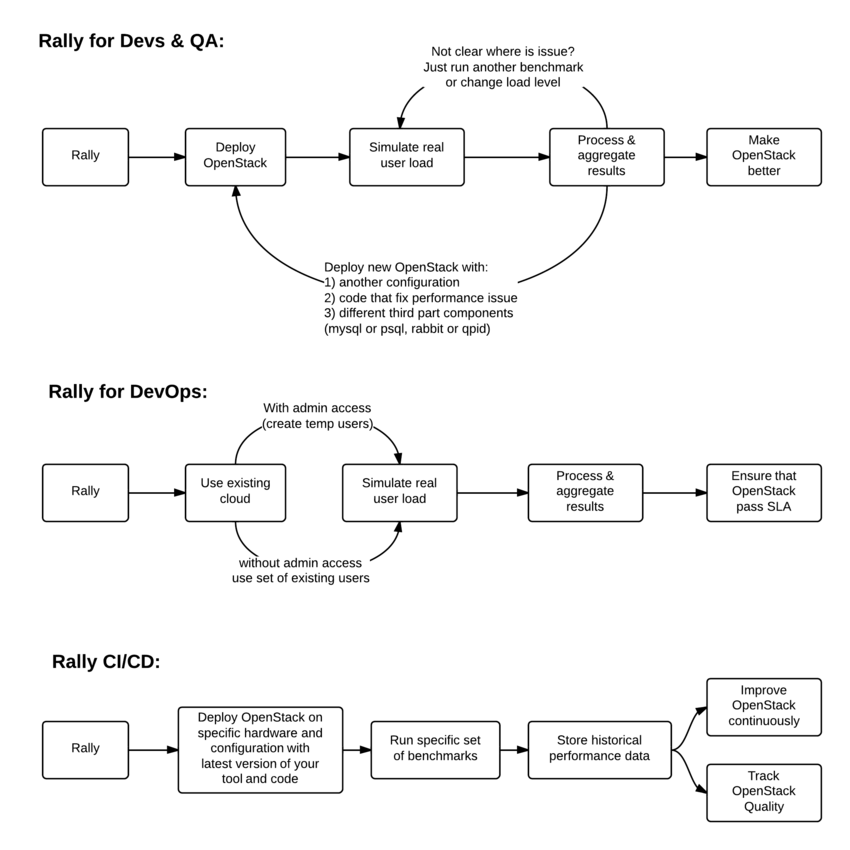
Typical cases where Rally aims to help are:
- Automate measuring & profiling focused on how new code changes affect the OS performance;
- Using Rally profiler to detect scaling & performance issues;
- Investigate how different deployments affect the OS performance:
- Find the set of suitable OpenStack deployment architectures;
- Create deployment specifications for different loads (amount of controllers, swift nodes, etc.);
- Automate the search for hardware best suited for particular OpenStack cloud;
- Automate the production cloud specification generation:
- Determine terminal loads for basic cloud operations: VM start & stop, Block Device create/destroy & various OpenStack API methods;
- Check performance of basic cloud operations in case of different loads.
Architecture
Usually OpenStack projects are as-a-Service, so Rally provides this approach and a CLI driven approach that does not require a daemon:
- Rally as-a-Service: Run rally as a set of daemons that present Web UI (work in progress) so 1 RaaS could be used by whole team.
- Rally as-an-App: Rally as a just lightweight CLI app (without any daemons), that makes it simple to develop & much more portable.
How is this possible? Take a look at diagram below:
So what is behind Rally?
Rally Components
Rally consists of 4 main components:
- Server Providers - provide servers (virtual servers), with ssh access, in one L3 network.
- Deploy Engines - deploy OpenStack cloud on servers that are presented by Server Providers
- Verification - component that runs tempest (or another pecific set of tests) against a deployed cloud, collects results & presents them in human readable form.
- Benchmark engine - allows to write parameterized benchmark scenarios & run them against the cloud.
But why does Rally need these components?
It becomes really clear if we try to imagine: how I will benchmark cloud at Scale, if ...
Rally in action
How amqp_rpc_single_reply_queue affects performance
To show Rally's capabilities and potential we used NovaServers.boot_and_destroy scenario to see how amqp_rpc_single_reply_queue option affects VM bootup time. Some time ago it was shown that cloud performance can be boosted by setting it on so naturally we decided to check this result. To make this test we issued requests for booting up and deleting VMs for different number of concurrent users ranging from one to 30 with and without this option set. For each group of users a total number of 200 requests was issued. Averaged time per request is shown below:
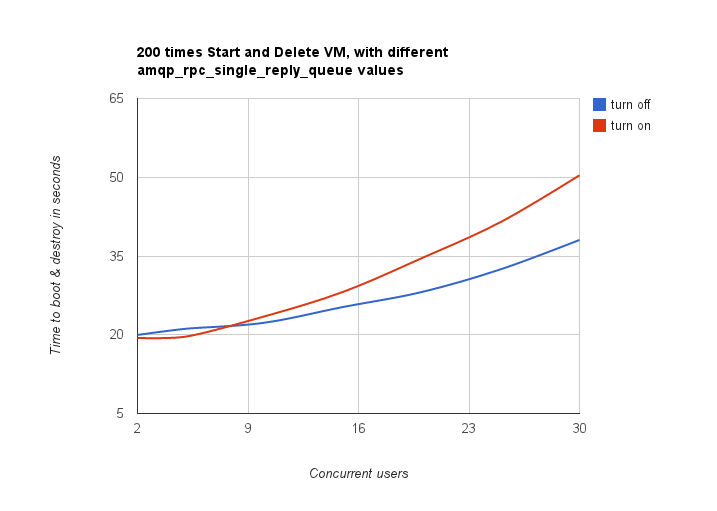
So apparently this option affects cloud performance, but not in the way it was thought before.
How To
Actually there are only 3 steps that should be interesting for you:
Weekly updates
Each week we write up on a special weekly updates page what sort of things have been accomplished in Rally during the past week and what are our plans for the next one. Below you can find the most recent report.
The first thing we would like to mention today is an extensive piece of work that has been done recently on our Wiki. We have updated both the main page and the basic tutorials: how to install Rally and how to use it. These tutorials have been simplified quite a lot and have been updated with new features that have been merged in Rally recently.
As for the actual updates in the Rally code, the main ones are as follows:
- The refactoring of the ScenarioRunner class has been successfully continued by reimplementing different benchmark execution strategies (continuous/periodic executions), which resided previously inside the original class, via subclassing. The new ContinuousScenarioRunner and PeriodicScenarioRunner classes enable us to make the code much more readable (no more complicated if...else logic to choose the appropriate execution strategy is present in the code) and extendable, so that it is now very easy to add your own ScenarioRunner (https://review.openstack.org/#/c/70771/);
- We've successfully started the work on Tempest & Rally integration in order for the latter to be able to perform OpenStack deployment verification procedures as well as to possibly add new Tempest-based benchmark scenarios (https://review.openstack.org/#/c/70131/);
- On the way to adding a full support for benchmarking with predefined OpenStack users (instead of using the generated ones), we've refactored the Endpoint entity, making it able to distinguish between administrator/user permisisons. Besides, each deployment gets now stored in the database with a list of endpoints instead of only one endpoint, since we are going to enable the DummyEngine to take several endpoints as its input (https://review.openstack.org/#/c/67154/);
- One of the future features of Rally will be Heat-based benchmark scenarios which will make it possible to test the VMs performance. This week, we have started contributing to this as well (https://review.openstack.org/#/c/72749/);
- Among many other simplier refactoring patches finished this week, we'd like to mention the one that improves the CLI code by structuring it to submodules (https://review.openstack.org/#/c/73059/).
The ongoing work includes:
- Further changes needed for the DummyEngine in order to be able to accept predefined user endpoints (instead of a single admin endpoint) and for the ScenarioRunner to use them in benchmarks (https://review.openstack.org/#/c/67643/, https://review.openstack.org/#/c/67710/, https://review.openstack.org/#/c/67720/);
- New benchmark result visualization tool based on nvd3 plugin to d3.js (so that the actual charts are drawn to a html file). This also includes a new CLI command rally task plot2html <task_uuid> (https://review.openstack.org/#/c/72970/);
- Adding 90- and 95-percentile results to the CLI output for benchmark runtimes, i.e. printing the runtime ranges that encompass 90% and 95% of benchmarks respectively (https://review.openstack.org/#/c/73522/);
- Continuing the work on Rally & Tempest integration, new deployment engine types etc.
We encourage you to take a look at new patches in Rally pending for review and to help us making Rally better.
Source code for Rally is hosted at GitHub: https://github.com/stackforge/rally
You can track the overall progress in Rally via Stackalytics: http://stackalytics.com/?release=icehouse&metric=commits&project_type=all&module=rally
Open reviews for Rally: https://review.openstack.org/#/q/status:open+rally,n,z
Stay tuned.
Regards,
The Rally team
Join Rally team
Discussions & RoadMap
https://etherpad.openstack.org/p/Rally_Main
Open and assigned tasks
https://trello.com/b/DoD8aeZy/rally
To get account ping Boris in IRC (boris-42) or email me (boris(at)pavlovic.me)
IRC chat
server: freenode.net
chanel: #openstack-rally
Weekly Meetings
The Rally project team holds weekly meetings on Tuesdays at 1700 UTC in IRC, at the #openstack-meeting channel.
Source
https://github.com/stackforge/rally
Project space
Blueprints
active: http://blueprints.launchpad.net/rally
v1 base: https://blueprints.launchpad.net/rally/+spec/init
Bugs
https://bugs.launchpad.net/rally

